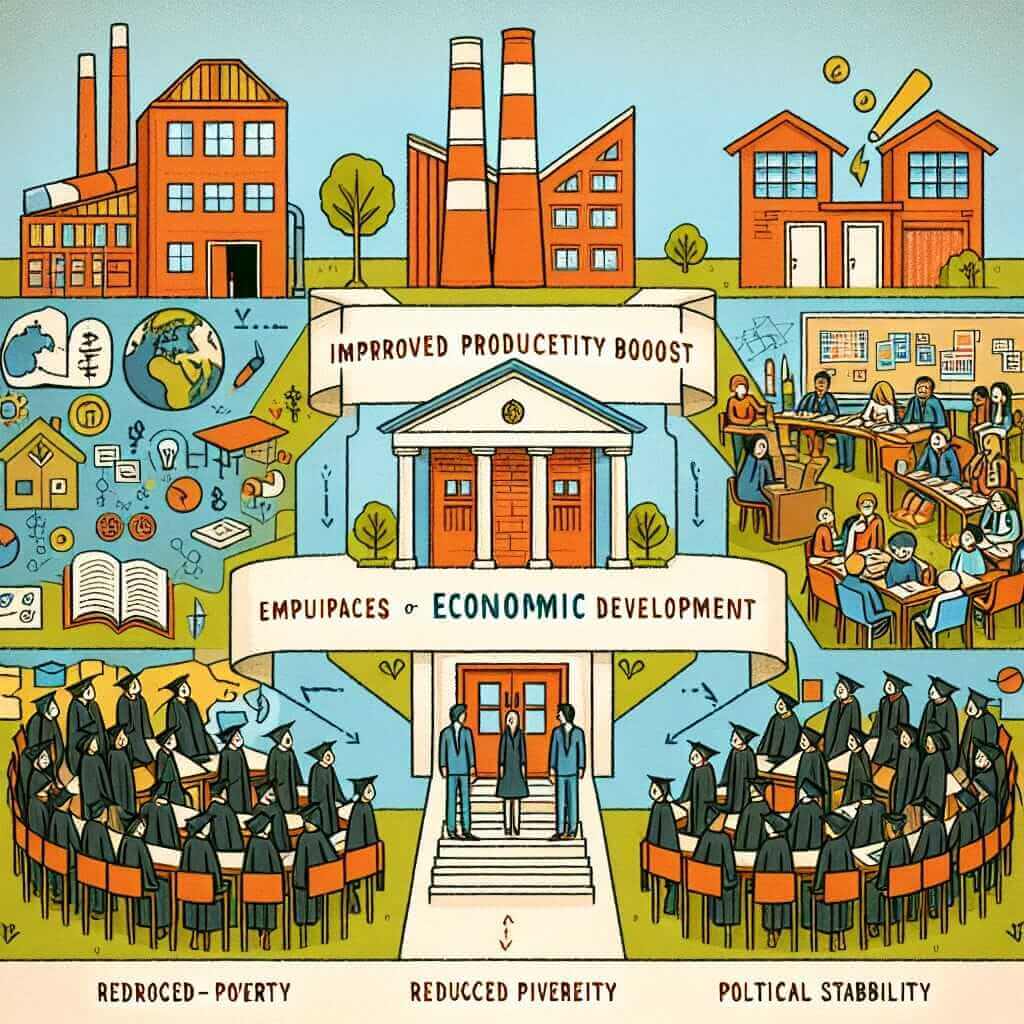The Reading section in the IELTS exam consists of 40 questions that candidates must answer in 60 minutes. The questions are based on three long texts, which may be from books, journals, magazines, and newspapers. Understanding the role of education in economic development is a relevant and insightful topic that may appear in the IELTS exam, given its global importance and frequency of discussion. This article provides a detailed practice exercise focused on this topic, offering valuable insights and preparation for IELTS candidates.
Reading Passage and Questions
Reading Passage: The Role of Education in Economic Development
Education is widely regarded as a key driver of economic development. It plays a crucial role in fostering economic growth, reducing poverty, and improving individual outcomes. Over the past few decades, numerous studies have shown that increased access to quality education leads to better economic performance at both the individual and national levels.
Firstly, education enhances the skills and competencies of the workforce. Countries with higher levels of educational attainment tend to have more skilled labor forces, which are essential for the adoption of new technologies and innovations. This, in turn, leads to increased productivity and competitiveness in the global market.
Moreover, education helps to reduce poverty by providing individuals with the skills necessary to secure well-paying jobs. In many developing countries, lack of education is a significant barrier to economic advancement. By investing in primary, secondary, and higher education, governments can help break the cycle of poverty and create more equitable societies.
Education also contributes to better health outcomes, which are closely linked to economic development. Educated individuals are more likely to make informed health choices and access healthcare services, leading to a healthier workforce. This reduces healthcare costs and increases economic output.
Additionally, education promotes social cohesion and stability. Societies with higher levels of education are often more politically stable and experience lower levels of violence and crime. This creates a more conducive environment for economic activities and attracts investment.
Governments play a critical role in ensuring access to quality education. Public policy initiatives focused on improving educational infrastructure, training teachers, and providing financial assistance to students can significantly enhance educational outcomes. Furthermore, international organizations and partnerships can support these efforts through funding and expertise sharing.
In conclusion, education is a fundamental pillar of economic development. Its impact on individual and national prosperity cannot be overstated, and continued investment in education is essential for sustained economic growth and development.
Questions
Multiple Choice
-
What is the primary focus of the text?
- A. The relationship between education and healthcare.
- B. The impact of education on economic development.
- C. The challenges faced by the education sector.
- D. The role of technology in education.
-
Which of the following is NOT mentioned as a benefit of education in the text?
- A. Increased productivity.
- B. Improved political stability.
- C. Higher healthcare costs.
- D. Reduced poverty.
True / False / Not Given
-
Educational advancements lead to better competitiveness in the global market.
- True
- False
- Not Given
-
The text states that only higher education is essential for economic development.
- True
- False
- Not Given
-
International organizations have no role in supporting educational initiatives.
- True
- False
- Not Given
Matching Information
Match each statement (6-8) from the text with the correct paragraph (A-F).
- Education reduces healthcare costs.
- The role of governments in education.
- Education promotes social cohesion.
- A. Paragraph 1
- B. Paragraph 2
- C. Paragraph 3
- D. Paragraph 4
- E. Paragraph 5
- F. Paragraph 6
Answers
Multiple Choice
- B. The impact of education on economic development.
- C. Higher healthcare costs.
True / False / Not Given
- True
- False
- False
Matching Information
- D. Paragraph 4
- E. Paragraph 5
- F. Paragraph 6
Key Lessons
Common mistakes in handling these types of questions include misinterpreting the information provided in the text and not paying close attention to details that distinguish similar options in multiple-choice questions.
Vocabulary
- Attainment (noun) /əˈteɪnmənt/: The action or fact of achieving a goal.
- Competencies (noun) /ˈkɒmpɪtənsiːz/: The set of skills and knowledge needed to do a particular job.
- Conducive (adjective) /kənˈdjuːsɪv/: Making a certain situation or outcome likely or possible.
- Initiatives (noun) /ɪˈnɪʃətɪv/: The ability to assess and initiate things independently.
- Equitable (adjective) /ˈɛkwɪtəbəl/: Fair and impartial.
Grammar
- Relative Clauses: “which are essential for the adoption of new technologies” – Adds extra information.
- Complex Sentences: “Over the past few decades, numerous studies have shown that increased access to quality education leads to better economic performance” – Combines multiple ideas for a more sophisticated sentence structure.
Advice for High IELTS Reading Scores
- Practice Regularly: Consistent practice helps in improving comprehension speed and accuracy.
- Develop a Wide Range of Vocabulary: Understanding diverse topics and terms will aid in answering questions correctly.
- Time Management: Learn to allocate time effectively to answer all questions within the given time.
- Analyze Past Papers: Familiarize yourself with the types of questions commonly asked in the IELTS reading section by practicing past papers.
- Focus on Keywords: Identify and understand the keywords in the passage, which often contain the answers to the questions.
Remember, achieving a high score in IELTS Reading requires a good grasp of English, keen analytical skills, and consistent practice.
 Education's Role in Economic Development
Education's Role in Economic Development
By investing time and effort in practice, you can improve your Reading skills and enhance your chances of success in the IELTS exam.


